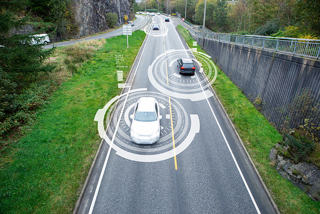Thatcham Research has announced 2019 digital compromise updates to the New Vehicle Security Assessment (NVSA) programme.
The NVSA is the security standard against which all new cars are assessed as part of the insurance group rating and will be updated in 2019, giving carmakers the opportunity to bring in fresh measures to address the challenges presented by digital theft techniques.
The updates are designed to shut down keyless entry vulnerability, while anticipating other potential methods of digital and cyber-compromise.
Thatcham Research’s chief technical officer Richard Billyeald (pictured) said: “Car crime is on the increase, with intelligence suggesting that electronic compromise is a factor in as many as one in four vehicle thefts.
“In the 1990s, the NVSA effectively brought an end to a car crime epidemic by introducing alarms and double-locking door functions, amongst other measures.
"Initiated in 1992, a year which saw 620,000 car thefts, this approach was instrumental in driving theft levels down by 80% up to 2016.
“In the same way, collaborative and concerted action from Thatcham Research, carmakers, Police and insurers will close the digital vulnerabilities exploited by today’s criminal gangs.”
Vulnerabilities in on-board electronic systems will be included in the new standards, alongside the increase in ‘chop shops’ - illicit garages where cars are dismantled to be sold on the spare parts market.
Billyeald said: “CCTV footage of criminal gangs exploiting a vulnerability in keyless entry systems has been highly visible in recent months. However, we estimate that only 1% of cars on the road have this technology.
“Carmakers are already introducing keys with motion sensors which deactivate when stored, and new secure signal transmission technologies.
"In the short term, while these counter-measures come into the market, concerned drivers should contact their dealer to discuss the digital functionality of their cars.
“The online availability of tools which criminals can plug into vehicles to programme a false key is also a concern.
"We support recent calls from the Police for closer regulation of the sale of these devices, which have no use outside of a licensed bodyshop or garage.”
Thatcham Research advice for drivers with concerns about car security:
- Understand the digital functions of your car: do you have a keyless entry system? If so, can the fob be switched off overnight? Speak to your dealer about software updates and whether new key fobs with added security are available
- Store keys away from household entry points: a keyless fob should be stored as far into your home as is possible, hampering a criminal’s ability to detect and relay its signal
- Make sure shielding devices work: Faraday pouches and containers will block the signal from a keyless entry fob – but test this yourself to make sure it is effective
- Be vigilant: choose well-lit areas to park in, observe that your car has locked correctly and report any suspicious behaviour to the Police



















Login to comment
Comments
No comments have been made yet.